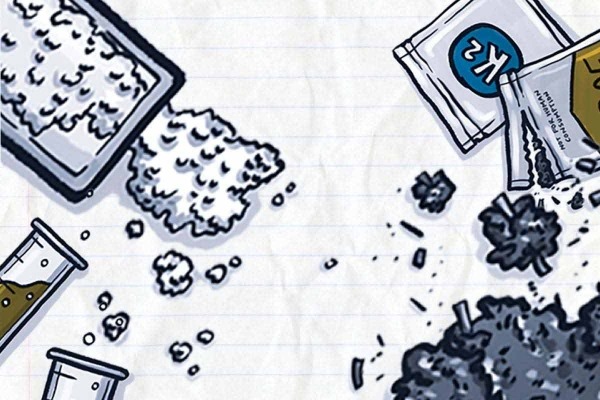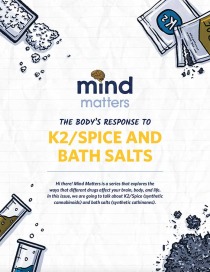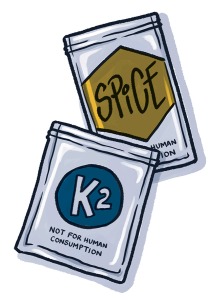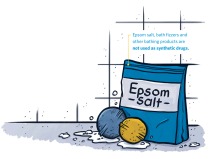A visually appealing booklet for students that explains how synthetic drugs, such as K2/spice and bath salts, change the way the communication centers in the brain work and ultimately cause their effects. This booklet is part of the Mind Matters series focused on easy-to-understand scientific facts.


Hi there! Mind Matters is a series that explores the ways that different drugs affect your brain, body, and life. In this issue, we are going to talk about K2/Spice (synthetic cannabinoids) and bath salts (synthetic cathinones).
View the Mind Matters Teacher's Guide.
What are synthetic drugs?
Some drugs, like cocaine and marijuana, come from plants that grow in the earth. But synthetic drugs are made in labs. Both kinds can be dangerous.
Two common synthetic drugs are bath salts and K2/Spice. K2 and Spice are brand names for synthetic cannabinoids. Bath salts are an example of synthetic cathinones, but should not be confused with products such as Epsom salt that people use during bathing.
K2/Spice (Synthetic Cannabinoids)

K2 and Spice are chemicals that can alter your mind and make you see, feel, or hear things that aren’t there. These chemicals are sprayed onto dried leaves to look like marijuana, or are sold as liquids. Some of the chemicals are similar to the ones found in the marijuana plant, but it is a very different drug.
You may have seen K2 and Spice in stores in bright packages that say they are a natural product. But don’t be fooled! These products have lots of chemicals in them that are not safe. These products are also known as herbal or liquid incense.
How do people use K2/Spice?
People use K2 and Spice by smoking the chemical-sprayed leaves or inhaling the liquids in e-vaporizers or other products. They can also put the liquids into tea to drink.
How do K2/Spice affect your brain and body?
Short-Term Effects
- Feeling really relaxed
- Seeing and hearing things that aren’t there
- Being very confused
- Feeling anxious
- Fast heart rate
- Vomiting
Long-Term Effects
- Kidney problems
- Seizures
Bath Salts

“Bath Salts” are a brand name for a class of drugs called synthetic cathinones. Cathinones are drugs similar to the chemicals in the khat plant that grows in Africa. But the human-made version is much stronger and can be very dangerous. They look like little white or brown crystals. But they are not like the products you put in your bath to make it fizz. They are usually found in plastic or foil packages and are used to get high. Bath salts are sold under many different names like Bliss, Cloud Nine, Lunar Wave, Vanilla Sky, and White Lightning.
Bath salts are stimulants that can cause extreme energy, alertness, and attention. They can also alter your perceptions and cause you to act strangely or even violently. They are chemically similar to drugs like amphetamines and cocaine.
How do people use bath salts?
People swallow bath salts. They can also snort them up their nose or mix them with water and inject them into their body.
Learn more about Bath Salts.
How do bath salts affect your brain and body?
Short-Term Effects
- Fast heart rate
- Feeling really friendly
- Having panic attacks
- Seeing things that aren’t real
- Feeling very angry and being violent
Long-Term Effects
- Kidney problems
- Weak muscles
- Heart problems
Learn more: What are the other risks of using bath salts?
How do K2/Spice and bath salts work?
Compared to drugs like cocaine and marijuana, there is less research on how K2/Spice and bath salts work in the brain. Researchers do know that these drugs attach to the same areas in the brain, called receptors, where chemicals in cocaine and marijuana attach. Researchers have also found that K2/Spice can produce stronger effects than marijuana and that bath salts can produce stronger effects than cocaine.
Can you become addicted to synthetic drugs?
Yes, you can. Over time, all drugs can change the way your brain works. If you stop, you can start to feel really sad and sick. This makes it hard to stop using them. This is called addiction.
The right treatment can help someone who is addicted feel better and stop using synthetic drugs, but treatment is hard work and it can take many years to recover from addiction. The best approach is to never start using the drug in the first place.
What if someone I know needs help?
If you think a friend or family member has a problem with drugs, talk to an adult you trust — like a parent, coach, or teacher — right away. Remember, treatment is available and people can get better.



